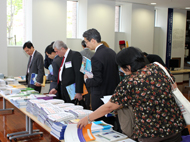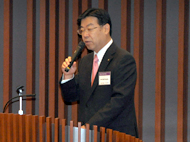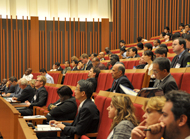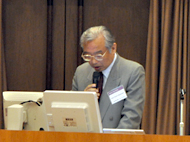Events
2010 Kyoto Policy Forum - Sustainable Institutions and Infrastructure for Safe Communities -
Date: May 18, 2010
Venue: Funai Auditorium, Katsura Campus, Kyoto University, Japan
Organized by:
- Global Facility for Disaster Reduction and Recovery
- Kyoto University Global COE Program "Global Center for Education and Research on Human Security - - Engineering for Asian Megacities"
- Kyoto University
- International Strategy for Disaster Reduction
Co-organized by:
Ministry of Foreign Affairs, Government of Japan
Number of attendants: more than 150
Poster
Agenda
Report 100
Outline
A global knowledge-sharing event "2010 Kyoto Policy Forum" was organized on May 18, 2010 by the Kyoto University Global COE program "Global Center for Education and Research on Human Security Engineering for Asian Megacities," the Global Facility for Disaster Reduction and Recovery (GFDRR), and the United Nations/International Strategy for Disaster Reduction (UN/ISDR) in cooperation with the Ministry of Foreign Affairs (MOFA), the Government of Japan. The emerging issues in ensuring sustainable infrastructure and institutions for safe communities in the ongoing global efforts for accelerated implementation of the Hyogo Framework for Action (HFA) were discussed. The purpose of this joint forum was to share knowledge and experience updated from recent disaster reduction and recovery activities in different countries and regions, and to pursue an effective cross-border and international cooperation framework for emergency cases as well as at the stage of preparedness.
Report
GFDRR was launched by the World Bank in September 2006 to reduce disaster risks and to promote post-disasters recovery in low- and middle-income countries, which are vulnerable to natural disasters, by supporting their efforts toward the implementation of HFA. According to the above action plan, this joint policy forum was planned at the initiative of the GCOE-HSE. The participants of the Policy Forum discussed lessons and experiences in pursuing three inter-linked priorities, namely, protection of critical infrastructure, urban disaster risk management, and empowerment of local institutions and communities in different regions of the world to achieve substantive disaster risk reduction. Approximately more than 150 government representatives, development practitioners, and selected experts addressed the topics detailed above. The Governor of Kyoto Prefecture, Deputy-Director General of International Cooperation Bureau of MOFA, Director of World Bank, and the representative of Kyoto University provided distinguished opening remarks. Professor Matsuoka introduced the concept of human security engineering in his keynote lecture. Interactive sessions explored the topics identified, and a final plenary session distilled the following policy implications to take forward.
Common framework and risk indicators should be pursued to understand each other in cross-border way by respecting own cultures and differences of disaster risks. We need to act collectively to realize effectiveness of DRR by seeking partnership strategies. Conducive framework and environment for DRR-related investments should be done through impact analysis, measurement of disaster losses. We need to clarify the way of capacity building of national and local government officials. Information sharing to seek different types of knowledge from emergent and recovery phases to needs assessment should be started for reconstruction. We need to seek concrete measures for DRR such as regional framework for risk profiles, risk financing multi-country help, and mobilization of expertise and databases.




